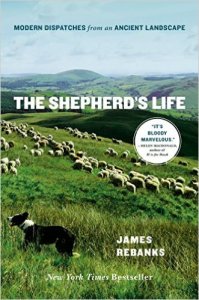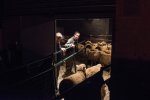I have been ruminating about sheep. Rumination, to ponder about something, comes from the Latin ruminare, “to chew over again.” Sheep are ruminants. Metaphorically, humans are as well.
Lest you think there is something kinky going on, let me assure you my interest in sheep stems from long-standing encounters from my childhood, trekking over heather-festooned wildscapes in Scotland. More recently, my friend Erika and I have fantasized about retiring to a sheep farm–with our families (who can do most of the work).
Sheep appear in medieval women’s lives too. Think of Joan of Arc as a shepherdess.

Here is a poignant quote about her work with sheep:
When the King came to La Ferté and to Crespy-en-Valois, the people ran about him, crying “Noel!” The Maid was then riding between the Archbishop of Rheims and myself: “This is a good people,” she said to us; “I have seen none elsewhere who rejoiced as much at the coming of so noble a King. How happy should I be if, when my days are done, I might be buried here!” “Joan,” then said the Archbishop to her, “in what place do you hope to die?” “Where it shall please God,” she answered; “for I am not certain of either the time or the place, any more than you are yourself. Would it might please God, my Creator, that I might retire now, abandon arms and return to serve my father and mother and to take care of their sheep with my sister and my brothers, who would be so happy to see me again!”
Sheep continue to graze through culture.

This past week, The New York Times has reported about and reviewed a new musical production of De Materie, an Dutch opera by Louis Andriessen, comprising a multitude of texts, including some by the 13th century Dutch visionary, Hadewijch of Brabant. Read one of her poems here.
Hadewijch is not alone in this operatic work. There has been an outpouring of attention onto the non-human actors in this musical piece: 100 sheep. Appearing towards the end of the work, these new “opera divas” have become a sensation that you can read about here.
Reviewer Anthony Tommasini eulogizes them: “On Tuesday the sheep, almost as if directed to do so, moved slowly, huddling and hovering in a circle, like particles spinning within an atom. And their occasional bleating lent a lovely natural touch to the score.” Hear the section in which the sheep appear:
I am happy sheep are finally getting their due. Or should I say “dew”?
Top on my list to buy:


